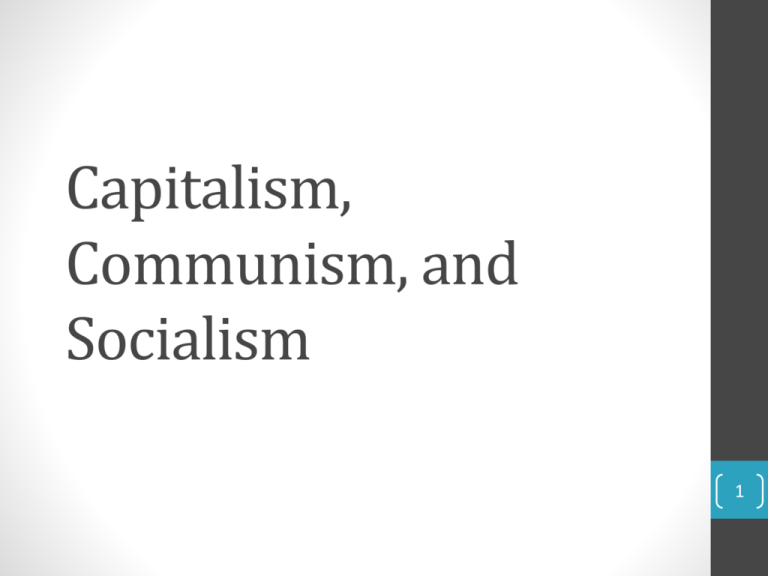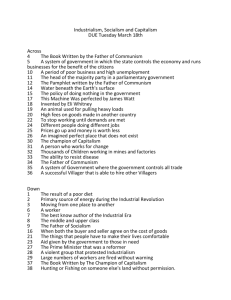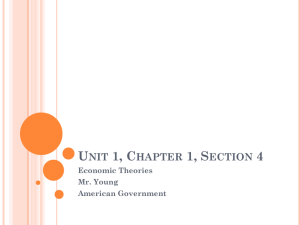03 Capitalism, Communism, Socialism
advertisement

Capitalism, Communism, and Socialism 1 Essential Question: What are the differences between capitalism, communism, and socialism? 2 The Industrial World… 3 Laissez-faire • “Let do” or “Leave it alone,” “Let people do as they please” • Owners of industry and business set working conditions without interference of governments 4 Free Economies/Markets • Adam Smith • 1776: The Wealth of Nations • No government interference • 3 Natural Laws of Economics: 1. Self-Interest 2. Competition 3. Supply and Demand 5 Capitalism • “An economic system based on private ownership and on the investment of money in business ventures in order to make a profit.” 6 Capitalist Thinkers • Thomas Robert Malthus • 1798: An Essay on the Principle of Population • Population will outgrow food supply = poverty • David Ricardo • 1817: Principles of Political Economy and Taxation • Growing population causes low wages 7 Problems with Capitalism • Uneven distribution of wealth • Wealthy factory owners • Poor working conditions • Pollution • “Survival of the fittest” 8 Karl Marx • German journalist • Radical writings expels him from Germany, France, and Belgium • 1849: Left Continental Europe for England • Remained poor on principle (support and reform for working class) 9 Friedrich Engels • German Philosopher • Father was a textile factory owner • Worked as a business apprentice by day; revolutionary interests • Helped work with (and finance) Karl Marx 10 Communism • Karl Marx and Friedrich Engels: • The Communist Manifesto (1848) • Bourgeoisie vs. Proletariat (“haves” vs. “have nots”) • Revolution • Worker uprising overthrows the capitalist system • Classless society 11 Communism • An economic system in which all means of production– land, mines, factories, railroads, and businesses– are owned by the people, private property does not exist, and all goods and services are shared equally. 12 Communism Globally • 1900’s: Marxist revolutions • Russia: Vladimir Lenin • China: Mao Zedong • Cuba: Fidel Castro • Communism Today: • North Korea • Cuba 13 Problems with Communism • Motivation to work? • What incentives might there be? • Classless societies don’t occur • Corruption • In the end, it fails… 14 How can the ill effects of the Industrial Revolution be changed? • Charles Fourier and Henri de Saint-Simon • Optimism • Progress • Social Justice 15 Socialism • An economic system in which the factors of production are owned by the public and operate for the welfare of all. • Government plans the economy • End of poverty and promotion of equality • Socialism Today: • Sweden • Bernie Sanders 16 Problems with Socialism Pros • Government programs for all • Healthcare for every citizen Cons • High taxes for government programs • What about the wealthy who could afford other healthcare? 17 Capitalism • Individuals own property and means of production • Progress comes from individuals • Businesses compete for profits. (Better and less expensive products) • Consumer compete to buy at lowest prices • Government doesn’t/shouldn’t interfere in economy Socialism • Community and state own property and means of production • Progress comes from cooperation of community of producers • Community and state should protect workers • Distribution of goods according to individual need 18 19 What are the differences between capitalism, communism and socialism? 20








